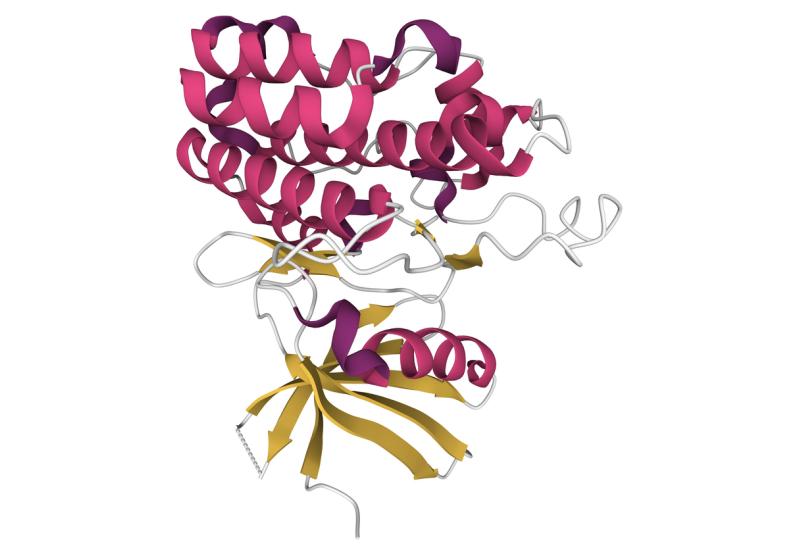
Novita goes into phase 3
Meanwhile, ASK Pharm challenges Hutchmed in cMet.
Meanwhile, ASK Pharm challenges Hutchmed in cMet.

Fresh from presenting mid-stage data for NP-G2-044 at ASCO, the private biotech Novita Pharmaceuticals has moved this small-molecule Fascin inhibitor into its first pivotal trial. The phase 2/3 Ultimus-1 study is to start this week, according to a just unveiled clinicaltrials.gov listing, seeking to enrol 380 patients with platinum-resistant ovarian cancer, and compare NP-G2-044 plus doxorubicin versus doxorubicin alone.
Another small molecule newly into pivotal development is ASK Pharm's cMet inhibitor ASKC202, in a setting that's seen buy-in from Hutchmed. For Novita, a company founded in 2010, Fascin inhibition is a sole focus, and the only other Fascin inhibitor in development, according to OncologyPipeline, is Beijing Shuanghe's DC05F01, which started a phase 1/2 solid tumour study last year.
Novita claims that inhibiting Fascin can disrupt tumour cell motility, and enhance immune cell activation and expansion, as well as offering the promise of synergy with PD-1 blockade to overcome resistance to treatment with checkpoint drugs.
However, the ovarian cancer setting of Ultimus-1 is unusual, in that this isn't one of the tumour types in which Novita's ASCO presentation claimed NP-G2-044 showed activity.
The ASCO data, from a phase 2 trial in which NP-G2-044 was combined with standard-of-care anti-PD-1 drugs, concerned 33 patients with various cancers said to have primary or acquired resistance to anti-PD-(L)1 therapy. Among these Novita claimed four Recist responses, in cervical, endometrial, lung and bile duct cancers.
If ovarian cancer is thus a new indication for NP-G2-044, it should be noted that Ultimus-1 doesn't represent a move straight into phase 3. Rather, this trial's phase 2 portion will first investigate dose escalation with a view to determining adverse events, before progressing into dose optimisation, where ORR and PFS endpoints will be tested.
Adverse events are of key significance. The ASCO presentation revealed respective 13% and 4% rates of grade 3 and 4 alanine aminotransferase increases, for instance, though apparently no dose-limiting toxicities were seen.
cMet inhibition
Meanwhile, the cMet space recently saw the approval of AbbVie's Emrelis, but this anti-cMet ADC represents a distinct approach versus small molecules; the former involves binding to wild-type cMet overexpressed on certain cancers, whereas the latter involves precise targeting of mutated cMet, which is an oncogenic driver.
As such, the two US-approved cMet inhibitors, Novartis's Tabrecta and Merck KGaA's Tepmekto, are indicated for NSCLC harbouring cMet exon 14 skipping alterations. However, neither drug generates significant revenues.
Now China's ASK (also known as Aosaikang Pharmaceutical) is advancing ASKC202 into phase 3, specifically in combination with that company's limertinib, an Innovent-partnered, Tagrisso-like molecule that was approved in China in April for first-line EGFR-mutant NSCLC. The phase 3 study will enrol 286 post-EGFR TKI patients, and compare the combo against platinum chemotherapy.
Notably, this is distinct from the exon 14 skipping indications of Tabrecta and Tepmekto, whose pivotal studies in post-EGFR TKI settings were terminated. Other notable players in second-line cMet-positive NSCLC are Hutchmed/AstraZeneca's Orpathys (awaiting China approval) and Haihe Biopharma's Haiyitan (in phase 3), both in combination with Astra's Tagrisso.
Selected phase 3 trial initiations
| Project | Mechanism | Company | Study | Setting |
|---|---|---|---|---|
| NP-G2-044 | Fascin inhibitor | Novita Therapeutics | Ultimus-1* | Post-Avastin platinum-resistant ovarian cancer, doxorubicin combo, vs doxorubicin |
| ASKC202 | cMet inhibitor | ASK Pharm | ASKC202-301 | Post-EGFR TKI NSCLC with cMet amplification/overexpression, limertinib combo, vs platinum chemo |
Note: *has phase 2 dose-escalation portion. Source: OncologyPipeline.
1201













